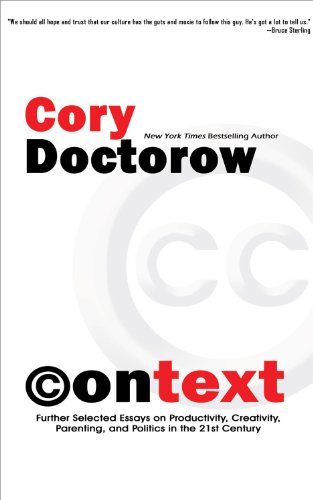When you consider the entirety of Cory Doctorow’s creative output, it’s actually a bit surprising that the first title in his bio is “science fiction novelist.” After all, if you add up the amazing amount of blog posts, magazine articles, newspaper columns, speeches and various other non-fiction he produces, I’m pretty sure that they would add up to more words per calendar year than his fiction, and in terms of visibility it’s quite possible that more people have seen his name connected to a blog post or newspaper column than on the cover of a novel.
Adding some balance to Cory’s bibliography, Tachyon Publications just released Context, Cory’s second collection of essays after 2008’s Content. Fans of the author will know what to expect, and for readers who are only familiar with Cory’s novels, this book is a great place to start and get to know one of the 21st century’s most interesting and prolific minds.
Context collects over forty of Cory Doctorow’s non-fiction pieces released since 2008. These were originally published in a number of other publications, including UK newspaper The Guardian, magazines such as Locus and Make, and blogs like Boing Boing (which Cory co-edits). Most of these essays are just a few pages long, making this one of those books that’s great to nibble at, reading one or two selections at a time rather than tearing through the whole thing in one sitting.
As for subject matter, the book’s subtitle is “Further Selected Essays on Productivity, Creativity, Parenting and Politics,” and those four categories sum up the book’s topics fairly well, as long as you’re okay with filing “copyright” and “privacy” under one of them. Many of these short essays read like expanded versions of Cory’s blog posts, chronicling what (in one of these essays) he calls “the vertiginous hilarity of our age of wonders.”
The common thread running through these essays is the point where technology, information and humanity intersect. Cory lovingly describes his writing process and the hardware and software he uses, talks about the way the various ebook outlets affect book distribution and the publishing industry in general, discusses why he won’t buy an iPad, relates how he became the victim of a phishing scam, and generally covers a wide range of topics that are relevant to anyone living in the information age, all in his usual direct, no-nonsense style. Given that all of these essays have individually been published in various outlets before, there’s a good chance that there won’t be a lot of new material here for people who follow Cory’s writing closely, but they draw from enough sources that there should be a few new things here even for the dedicated fans, and even if not, it’s still nice to have them all together in one cover.
Tor.com published a generous excerpt of Context over the weekend, and reading those five selections is a great way to find out if this book is for you. One of my favorites is the very first essay in the book, “Jack and the Interstalk: Why the Computer is Not a Scary Monster,” about how Cory and his toddler daughter Posey use the computer together. It’s insanely cute—she sits on his lap watching videos in a corner of the screen while he answers his morning email—but at the same time it’s informative and funny and highly relevant to any parent who is trying to figure out how to handle a toddler’s inevitable fascination with that shiny screen mommy and daddy spend so much time looking at. A few essays later, he fast-forwards to the usage of computers in the classroom and proposes a “Web Literacy” curriculum that suggests “censorware”—commonly used to limit web access in schools—as a starting point. Context is full of this type of fascinating and insightful material, coming from someone who’s given a lot of thought to how information and technology affect our lives in various ways.
Of course there’s also a good amount of material here about copyright (sample title: “Intellectual Property Is a Silly Euphemism”) and the “information wars” in general. I’m sure not everyone will agree with Doctorow when it comes to these issues, but even if you don’t, his long involvement with this topic at least goes a long way towards outlining the boundaries of the debate, which is sure to continue for many years to come. And again whether you agree with him or not, it’s refreshing to see someone who practices what he preaches with such enthusiasm. (As most people probably know by now, Cory offers all his books as free downloads under a Creative Commons license on his site. For people who want to show their appreciation for all those free books, he offers the opportunity to buy a copy for a classroom or public library in need — e.g. here’s the page to do so for Content, his first essay collection.
There aren’t a lot of authors out there that I consider myself a fan of. There are many writers whose books I love, but to me being a “fan” implies more than just having an appreciation for a writer’s creative output. It includes a few less tangible qualities, like the author being an interesting person and having a relevant blog and maybe even occasionally “doing the right thing.” Your definition of what constitutes interesting, relevant and right will obviously affect all of this, but for me Cory Doctorow is one of those people, and Context is a great example of why he’s more than just a great novelist. If you’ve enjoyed one or more of his novels in the past, Context is a good way to sample some of the other consistently entertaining information Cory Doctorow emits on a regular basis.
Stefan Raets reads and reviews science fiction and fantasy whenever he isn’t distracted by less important things like eating and sleeping. Many of his reviews can be found at Fantasy Literature.










